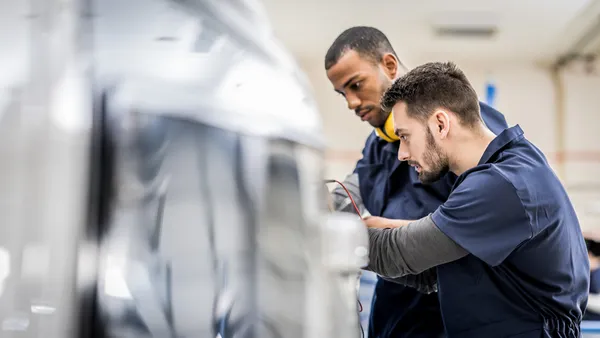More than half of companies in countries with leading economies plan to recruit new talent to handle AI adoption at work rather than upskill their existing workers, according to a new report by The Adecco Group, conducted in collaboration with Oxford Economics — and that could deeply trouble employers in the future, Adecco said.
In a survey of 2,000 C-suite executives across nine countries, 66% said they plan to “buy” AI-skilled talent externally, while 34% said they plan to “build” talent internally by training their existing workers.
“Artificial intelligence is emerging as a great disrupter in the world of work, and the current path is unsustainable,” Denis Machuel, CEO of The Adecco Group, said in a statement. “Companies must do more to reskill and redeploy teams to make the most of this technological leap and avoid unnecessary upheaval. Buying your way out of disruption should not be the only approach companies take.”
The AI skills gap extends to the top of companies, the leaders indicated, with 57% saying they lack confidence in their own C-suite’s ability to understand AI-related risks and opportunities. In addition, only 43% said they had formal training programs in place to improve AI skills, while 50% said they provide guidance to staff on how to use AI at work.
The “buy vs. build” gap also exists for other digital skills, according to the survey. About 62% of leaders said they’ll hire data literacy experts externally, as compared with 36% who said they plan to reskill or upskill their current teams. Beyond that, 60% plan to hire to fill digital literacy gaps, as compared with 37% who plan to build among current employees.
AI adoption will likely lead to job upheaval across the job market, the leaders said. About 46% said they’ll redeploy employees who lose jobs due to AI, and 41% said they’ll employ fewer people within five years due to AI tools.
As demand for AI skills continues to increase, pay will likely increase, too. In the survey, 37% of leaders said pay for AI-related roles will increase significantly during the next 12 months, as compared with 24% who said the same for white collar roles and 9% for blue collar roles.
But human skills continue to play a crucial role in business success, the leaders said. About 57% said the “human touch” remains more influential than AI at work, and leaders pointed to creativity and innovation as the main area with the biggest skills gap today.
“It is imperative that leaders not only urgently deploy AI upskilling but also ensure it is implemented safely and responsibly by keeping people firmly at the centre of this transition,” Machuel said. “AI should be a tool that supports people’s unique creative potential and enables more time for strategic thinking and problem solving.”
Although upskilling current employees is vital, most business leaders have voiced concerns that they can’t train workers quickly enough to keep up with AI and tech developments in coming years, according to a report by the World Employment Confederation. More than 90% of senior executives said they’ll need a more flexible workforce, which they’re building through sectoral talent pools, skills-based hiring, online talent platforms, contingent workers, internal flexibility and talent from other countries.
Many business leaders have indicated that AI is already changing their organizational structure, according to a Pearl Meyer report. The most responsive companies said they’re now developing a change management strategy and implementing employee communication plans to address AI adoption.
In the midst of major changes this year, talent leaders are also grappling with uncertainty around AI and work design changes, according to a Mercer report. In response, C-suites that appear to be successfully embracing AI said they’re prioritizing human-centric productivity, fostering trust, ensuring equitable work practices and focusing on a “digitally-infused future,” the report found.











